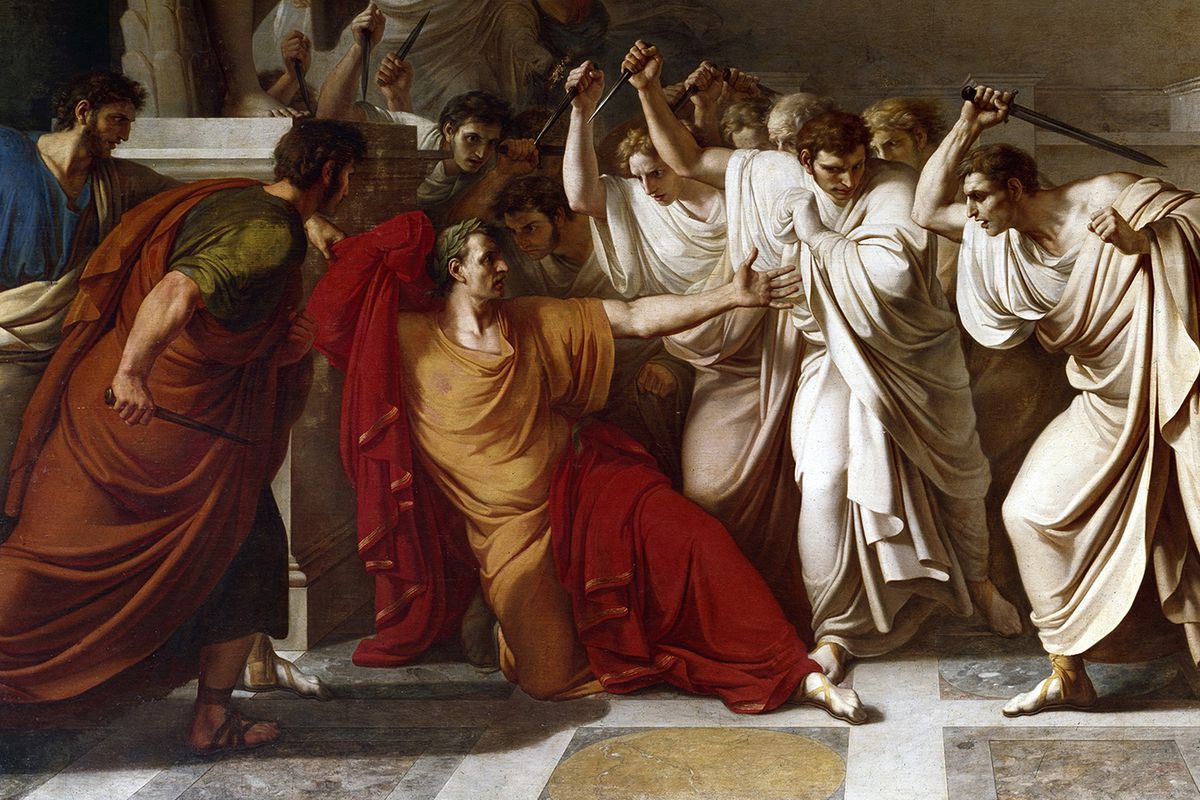Luke 13:31-35
“Et tu, Brute” (Even you, Brutus) are the famous words from William Shakespeare’s rendition of Julius Caesar’s assassination. On March 15, 44 B.C. Roman senators took turns stabbing their elected consul out of fear of his rising power. They saw a threat to their freedom. They conspired to kill that threat. That conspiracy went into action on the famous “Ides of March” (March 15). A coin minted under Brutus’ leadership is known as the “Eid Mar” denarius. On one side, it’s Brutus’ face. On the other are two daggers with a “pileus” (the cap of freedom or liberty cap) in the middle. Brutus’ and those with him felt that their action preserved Roman freedom. Others would say that they were trying to protect their power.
We are a few days removed from that famous date. It’s not the assassination planning by the Roman Senate that gets our attention. Instead, our attention is turned to our Savior and those who were planning his murder. Jesus proved to be a threat to a number of individuals. It wasn’t to the Roman Senate, but to the Pharisees. He also posed a threat to Herod Antipas. Both are mentioned in Luke 13:31-35.
First, Jesus addresses the Pharisees. They confront Jesus with news that Herod wants to kill him. While that may be true, these individuals also wanted Jesus out of the way. They tell him to leave. Instead of leaving, Jesus gave them some work to do. He sent them to Herod with a message. This isn’t the first time we run into Herod. He’s mentioned in Luke 3, Matthew 14, and Mark 6. Luke 9:7-9 tells us of the trouble Jesus caused Herod. He was perplexed. Word spread that this Jesus was John the Baptist back from the dead. Herod wanted to see him. Herod made his historical mark as the one to have John the Baptist put to death. Entertainment got him in trouble. And that still was on his mind when the reports would come that there was someone driving out demons and curing diseases. He wanted to see Jesus. But not for the right reasons. Later on, we would hear again that Herod would see him. He still desired entertainment. When Pontius Pilate tried to get out of responsibility, he sent Jesus over to Herod. Herod wanted a miracle. He would get one. Just not in his presence on Good Friday. The miracle would come on Easter Sunday.
Jesus then addresses the city, the place of Jerusalem. This city of peace would have its turmoil. Its actions were anything but peaceful. Jesus addresses it as the city that would kill prophets and stone the ones sent to them. Assassinations and murder would happen at her orders. For Jesus, it would come through those Pharisees and their plotting to kill him. It would involve the Roman governor and Herod. Groups that would normally be enemies found common ground in their ploy to rid the world of this Jesus of Nazareth. And Jesus would die at their hands. But not yet. Jesus would continue his ministry. He would continue teaching, preaching, driving out demons, and healing people. He would go to that city of Jerusalem and then die at a later date. But on the third day is when the ultimate miracle would happen. After his crucifixion, Jesus would rise from the dead. Many of those leaders would hear that message. Sadly, they would try to stop that message from being proclaimed. Jesus was a threat to them.
In the introduction, you heard of the Ides of March coin. The daggers symbolized the action taken. The cap in the middle was the justification for the use of those daggers. For the Pharisees, Herod, and Pilate they had their reasons too. They may not have made a coin to symbolize them but their conversations and attempts at justifying their actions display their sinful hearts. Earlier, Herod beheaded John the Baptist to honor his word. Pilate would wash his hands of Jesus’ blood. The chief priests who worked with the Pharisees would cry “we have no king but Caesar” (John 19:15). All thought that by killing Jesus they would once again be free to do what they pleased. Yet it is Jesus’ death and resurrection that truly brought freedom. As we contemplate that, think of the many sins we commit of where we try to justify our sinful actions because we feel it is our right, it is our freedom. “I’m only defending myself.” “My sharp tongue or comment is no where near the type of others. I have a right to say how I feel.” “They sinned against me first.” We, like those Pharisees, often want Jesus to go away. We, like that city of Jerusalem, can run away from the protecting wings of our Savior. Despite our attempts to stay attached to sin, death, and the devil, our Savior instead has attached us to himself. He did that by finishing his work in Jerusalem.
The Ides of March marked the shift from being a Roman Republic to a Roman Empire. But that empire didn’t last. Good Friday and Easter Sunday mark the days of when we have been set free from sin, death, and the devil. This is a freedom that has placed us in the kingdom of our Savior. That kingdom will last forever. The phrase “Et tu Brute” has some fame to it. We have some phrases far better. They are “It is finished” and “He is not here, he is risen!”
Daniel Lindner
For more content like this, check out the podcast, blog posts, and devotions at www.LetTheBirdFly.com.
You can listen to our latest episode here. You can find our latest installment in the Wingin’ It series on Luther here.

